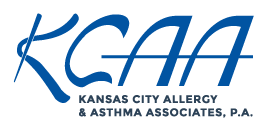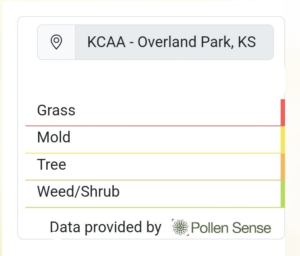MANAGING ALLERGIES & ASTHMA
MANAGING ALLERGIES & ASTHMA
People with allergies and asthma can lead active lives if their triggers are identified, and they adhere to a treatment plan. At KCAA, we are dedicated to educating our patients and community about causes and treatments, and we enjoy sharing information to make life easier.
Allergens can be better avoided by making simple changes. Awareness of surroundings and seasonality of symptoms improves year-round comfort.
Changes Around the House
If someone in the household has allergies, home can either be a haven or part of the problem. Once testing has determined specific allergy triggers, steps can be taken to make home safe. Dust mites, pet dander, and pests like cockroaches are common indoor allergens. Pollen and mold can also be found indoors.
Decrease indoor exposure to these allergens with these tips:
- Run the air conditioner and keep windows closed.
- If the allergy is triggered by pests, have the home professionally exterminated. Seal holes and cracks that may serve as entry points for pests. Store food in plastic containers and clean carefully so pests are not attracted.
- If the allergy is triggered by pets like dogs or cats, do not add furry friends to the household.
- If the allergy is triggered by dust mites, remember what dust mites love: human skin scales. Dust mites are drawn to bedding, upholstered furniture, and rugs. Wash linens weekly and wash blankets every 2 weeks. The minimum temperature to kill dust mites is 130 degrees Fahrenheit. Encase mattresses, box springs, and pillows in allergen-proof, zip-up covers.
- Stop outdoor allergens from entering. Leave dirty clothes or shoes at the door. Bathe at the end of the day to remove allergens from the body and hair before bedtime. Avoid being outside when the grass is mowed.
Changes With Seasons
Midwest weather changes constantly – and so do allergies. Here are some ways to keep hay fever in check:
- Stay inside on dry, windy days.
- Have someone else mow the lawn and other yardwork that stirs up allergens.
- Do not hang laundry outside. It can be a magnet for pollen.
- Pay attention to pollen counts. If high counts are expected, begin medication before symptoms start.
- Avoid outdoor activity in the early morning when pollen counts are usually highest.
- Keep doors and windows closed, especially at night.
- Use a high-efficiency particulate air (HEPA) filter in the bedroom.
- Clean floors with a vacuum cleaner that has a HEPA filter.
COMMON ALLERGENS
- Tree, grass, weed pollen
- Pet dander
- Insect venom
- Dust
- Mold
- Food
- Drugs
COMMON SYMPTOMS
- Runny nose
- Post-nasal drip
- Sneezing
- Congestion
- Coughing
- Itchy/watery eyes
LESS COMMON SYMPTOMS
- Headaches
- Loss of taste or smell
- Poor concentration
- Fatigue
- Sleep disturbances
- Snoring


